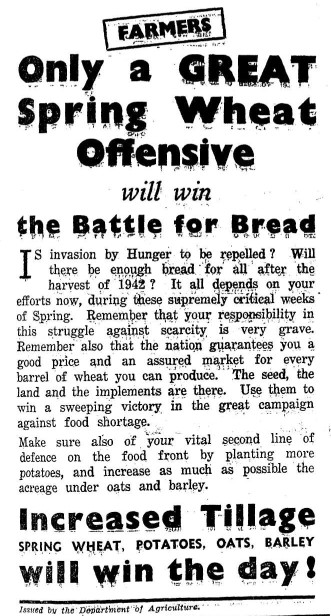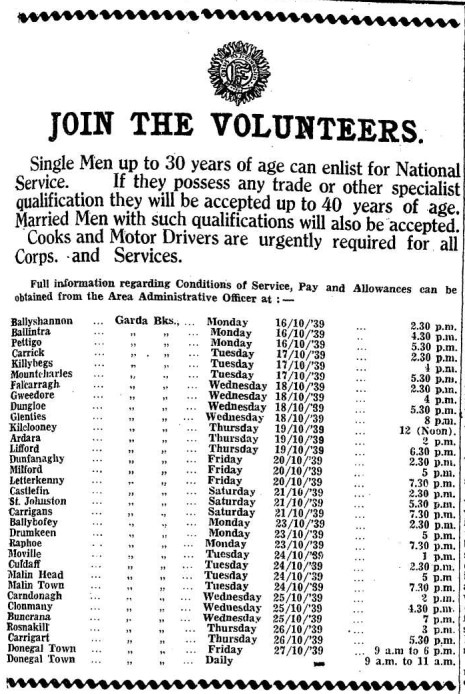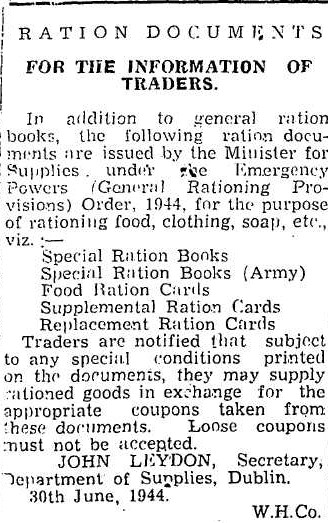
Rationing continued even after the war as this book from 1948 proves
Talk of escalating prices and the growing scarcity of good and a new spotlight on food security as a result of the ongoing barbarity in Ukraine prompted me to examine the situation in Ireland this month 80 years ago.
Then we were dealing with the same issues because of another war in Europe - WW2 or 'The Emergency' as it was known in the Republic of Ireland.
Of course, the situation was different north of the border and the ‘Democrat’ reported the unhappiness of Taoiseach Eamon deValera, who had not been informed of the arrival of US troops on Irish soil in Northern Ireland, neither by the British or American governments.

An advert from March 1942 in the Donegal Democrat is a reminder that aspects of history can often be found repeating themselves
The one good thing was the abundance of fish off the Donegal coastline and there was also the saviour that came in the guise of turf.
Because of the lack of transport much of the fish that may have been exported was finding tables closer to home.
The Killybegs notes of March 21, 1942 recorded:
“The line fishing continues with great success in Donegal Bay, from whose daily catches averaging eight boxes of haddock, whiting and codling are being landed by the Killybegs and St. John’s fleet. Prices range from £2 to £2 10s per box.”
A Ballintra correspondent suggested that it was the dullest St Patrick’s Day ever with “not even the sound of a drum to break the stillness”.

“Even a casual glance around reveals the fact that much has been done in the fields, and that there is a considerable amount of wheat sown, which will go to make history as well as bread and porridge. Not much has yet been done in the fields of setting potatoes but several people have early varieties in the ground.”
Fast forward those eight decades Inflation rates could rise here to a peak of 8.5% by summer, according to the ERSI, this week.

Spitfires a normal sight in WW2 Northern Ireland - there were a number of crashes
on both sides of the border, notably Donegal and Monaghan in the south
And with no easing in the geo political tensions, the Irish and European energy crisis will be a reality for a long time to come and it is something that we will have to adopt to.

The call for local Donegal Defence Force Volunteers at the outset of WW2
Agriculture Minister Charlie McConalogue’s recent comments about the need to grow more grains was a hot topic of debate, even within the farming community itself.
In 1942, the country introduced bread rationing and this followed other items that included tea, sugar, butter and flour.
Doctors were one of the few groups that could purchase new tyres.
The making of wellington boots other than for industrial purposes was also banned and lack of rubber imports meant production of new bicycle tyres was effectively discontinued.
In the North people were liable to prosecution if they burned or destroyed either paper or cardboard, but could use paper to start a chimney fire in the house, the Democrat told readers.
Of course, there was a booming trade in cross border smuggling, but that is another topic in itself, for another day.
The reality is that in terms of self sufficiency we, as a country, have failed miserably in recent decades.

A look at just some of the rationing cards needed later in 1944, as advertised in the pages of the Donegal Democrat
Our back-up stocks are also at tenuous levels, at the best of times, although there is a 90 day fuel supply that is always kept in reserve.
Even back in 1942, we had to had already had to deal with over reliance from other countries.
I read recently where we imported six million tons of animal feed from Britain in 1940 and 74,000 tons of fertiliser. Two years later that figure had been reduced to zero, as Churchill said it was required for his own people.
As with the changing shape of the map of Europe, we as a nation, must learn that any future world economy must be blended with a much greater reliance on ourselves, when it comes to food and energy, at the very least.
Subscribe or register today to discover more from DonegalLive.ie
Buy the e-paper of the Donegal Democrat, Donegal People's Press, Donegal Post and Inish Times here for instant access to Donegal's premier news titles.
Keep up with the latest news from Donegal with our daily newsletter featuring the most important stories of the day delivered to your inbox every evening at 5pm.